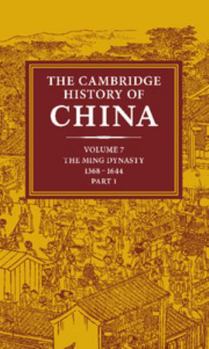The Cambridge History of China: Volume 7, the Ming Dynasty, 1368 1644, Part 1
(Book #9 in the Cambridge History of China Series)
This volume in the authoritative Cambridge History of China is devoted to the history of the Ming dynasty, with some account of the three decades before the dynasty's formal establishment, and of the Ming Courts, which survived in South China for a generation after 1644. Volume 7 deals primarily with political developments of the period, but it also incorporates background in social, economic, and cultural history where this is relevant to the course of events. The Ming period is the only segment of later imperial history during which all of China proper was ruled by a native, or Han dynasty. The success of the Chinese in regaining control over their own government is an important event in history, and the Ming dynasty thus has been regarded, both in Ming times and even more so in this century, as an era of Chinese resurgence. The volume provides the largest and most detailed account of the Ming period in any language. Summarizing all modern research in Chinese, Japanese, and Western languages, the authors have gone far beyond a summary of the state of the field, but have incorporated original research on subjects that have never before been described in detail. Volume 7 will be followed by a topical volume of Ming history (Volume 8) that will offer detailed studies of institutional changes, international relations, social and economic history, and the history of ideas and of religion.
Format:Hardcover
Language:English
ISBN:0521243327
ISBN13:9780521243322
Release Date:February 1988
Publisher:Cambridge University Press
Length:1004 Pages
Weight:3.45 lbs.
Dimensions:2.4" x 6.6" x 9.4"
Customer Reviews
1 rating
The Best History of the Ming
Published by Thriftbooks.com User , 17 years ago
This book and its companion volume (#8) provides the best history of China under the Ming in the English language. Period. It goes into details on all the Ming Emperors, their political problems, and their solutions (or lack of solutions). Given the level of detail and the length of the book (1000 pages) it is very readable and it offers a fascinating look at a culture and government which is, I would argue, poorly understood today. This book offers a consensus view on the Ming, and includes the work of many highly respected historians who contributed to the book including C. Hucker (the expert in Ming government), Ray Huang (the expert on Ming finances), and F. Mote (who taught Chinese history at Princeton for more than 40 years). Historical attitudes towards the Ming have changed from the 1960s and this book reflects our new understanding of how the state actually functioned. To pick one obvious detail: the Ming government was less autocratic and more under the control of the Mandarins than was previously thought. The fall of the Ming is told both here and in Volume 9 (also highly recommended).





